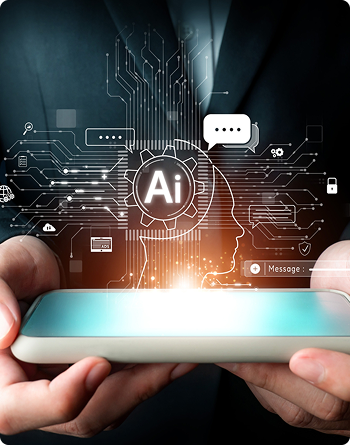The term “AI personalization” describes the application of artificial intelligence (AI) to customize services, product suggestions, and messages for specific consumers. AI-powered solutions generate highly tailored interactions that improve customer experiences and boost customer engagement by evaluating data and learning from user behavior.
Modern developments in AI, such as generative AI, have improved marketing strategies by producing tailored experiences almost instantly. These developments have ushered in an era of multichannel hyper-personalization—a seamless, personalized customer experience across platforms that instantly reacts to client behavior.
Customers now anticipate these customized experiences as AI-powered personalization grows increasingly sophisticated and potent. A recent survey shows that three out of five consumers want to utilize AI applications when making purchases. Additionally, according to McKinsey, a consulting firm, 71% of customers expect businesses to provide individualized content.
Sixty-seven percent of those clients said they become irritated when companies don’t cater to their needs.1. Personalization also drives expansion. According to the same survey, companies expanding quickly generate 40% more revenue through customization than those expanding more slowly.
AI personalization is implemented in numerous sectors today to generate insightful product recommendations and contextually appropriate experiences on a large scale. These strategies work for every target user, be it an individual online buyer, a procurement specialist in a business-to-business (B2B) company, or an employee who gets customized emails.
At Flynaut, we help businesses leverage AI to deliver personalized customer experiences that drive engagement and boost sales. Ready to transform how you connect with your audience? Let us show you how! Contact us now.
Applications of AI Personalization that are Sector-Specific Include:
- Online shopping: AI makes product recommendations in e-commerce based on browsing and purchasing history, taking into account the individual interests and needs of the customer. Additionally, it can create unique emails or other messages for customers, enabling targeted advertising campaigns.
- Entertainment: AI customization is usually used to power streaming service recommendations for tailored content. These recommendation algorithms surfaced playlists, movies, and other content based on user interests.
- Training and Education: Adaptive learning systems provide specialized educational resources and information, whether used in the workplace or not. They track progress and offer individualized comments using AI.
- Finance: AI personalization provides tailored financial advice and investment recommendations based on a user’s objectives and general market conditions.
- Marketing: AI personalization powers several marketing tactics, such as tailored email campaigns or online ads directed at particular customer segments.
Ai Personalization’s Advantages
AI systems can engage with every stage of the client journey, from perusing an online marketplace to receiving follow-up messaging regarding a particular good or service.
When properly implemented, AI personalization boosts sales. Organizations prioritizing customer experience (CX) stand to grow their revenue three times faster than their counterparts, according to a survey of hundreds of top CEOs. Personalized content was crucial to 86% of those executives’ CX campaigns.
The following are some of the main advantages of AI personalization:
- Dynamic Interactions with Customers: Customized experiences provide a digital experience appropriate for the context and are likely to foster good relationships with a brand, positively impacting loyalty and customer satisfaction.
- Heightened Involvement: Content personalization increases user engagement by giving consumers the information they are most likely to require.
- Increased Rates of Conversion: Sales are increased when relevant recommendations raise the chance of a buy.
- Savings on costs: By automating a large number of marketing campaigns, product recommendations, and customer support interactions with AI, businesses may free up resources for other uses. Some research suggests that a customization program may save customer acquisition costs by as much as 50%.
- An edge over competitors: Offering individualized experiences according to client preferences can provide a business with a big competitive edge. Certain brands, such as subscription services that provide their clients with selected products, mostly rely on AI personalization as part of their core business strategy.
- Making decisions based on data: AI customization makes detailed user data more accessible to businesses, which may be leveraged to make better-informed decisions by gaining insights into past, present, and future customer behavior. Businesses may rapidly and intelligently iterate by gathering insightful information about their most valued consumers using specific user data.
How Personalization with Ai Functions?

Natural language processing (NLP), generative AI, and machine learning (ML) are frequently used with AI-driven personalization. The procedure generally gathers contextual information such as location, time of day, and device utilized in addition to customer data on user behavior, preferences, and interactions. This data collection frequently entails combining datasets from other parties with organizational data.
AI systems then examine this data to find trends and patterns in user behavior. Audience segmentation is the process by which the AI divides users into groups according to shared traits and actions. By examining these segments and user behavior, the AI then suggests goods, services, or content that fit user tastes and demographics. It can also show different users different material on a website or app according to their individual profiles.
The AI improves its personalization process by “learning” from users and constantly adjusting to improve its suggestions and responses.
Applications of AI Personalization
Artificial intelligence personalization increases user engagement by making personalized recommendations and presenting material tailored to each user’s interests and requirements. Several important uses of AI personalization include:
- Specific product suggestions
- Chatbots driven by AI
- clever writing
- advertising targeting
- Variable costing
- Anticipatory customization
- Specific product suggestions
Artificial intelligence (AI) examines user data, such as browser history, social media interactions, buying trends, and preferences, to make product recommendations that suit personal preferences. This method is frequently utilized by e-commerce giants like Amazon and Netflix to boost sales and enhance user experience by displaying the most relevant products. The more information an AI has at its disposal along the customer journey—such as products bought or viewed at particular periods of the year—the more sophisticated and precise its suggestions become.
- Chatbots Driven by AI: Chatbots and virtual assistants driven by artificial intelligence (AI) deliver customized responses to user inquiries after “reading” and comprehending them. This allows for individualized interactions in conversational language. By handling customer service, making product recommendations, and helping with troubleshooting, these chatbots can improve user experience and make it more individualized and efficient. These chatbots, which are available 24/7, are highly efficient because they gather insightful data on customer engagement and purchasing patterns.
- Smart Writing: Using artificial intelligence (AI), content customization entails sending consumers customized emails, articles, product descriptions, videos, text messages, and other media depending on their interests and usage patterns. Organizations may save time and money by utilizing content customization to produce interesting and high-quality assets that connect with their target audiences.
- Advertising Targeting: By evaluating user data to present adverts that are most likely to interest a certain person, artificial intelligence (AI) improves targeted advertising. By delivering the proper message to the right audience, this improves marketing campaign efficacy and decreases waste in advertising efforts.
- Variable Costing: With the use of artificial intelligence (AI), dynamic pricing modifies prices in real-time in response to a range of variables, including supply, demand, customer behavior, and market dynamics. Dynamic pricing, which was formerly primarily utilized by travel and hospitality companies, is now employed by a number of other businesses to optimize pricing, increase income, and provide customers discounted rates during off-peak times.
- Anticipatory Customization: Artificial intelligence is used in predictive personalization to foresee user requirements and preferences before they are formally stated. AI can improve the user experience by anticipating what goods or information a consumer would be interested in next by examining past data. Starbucks, for instance, launched a predictive personalization program using machine learning algorithms to recommend particular drinks to app users based on their past purchases. The brand’s inventory management system also included forecasts of what customers will order based on the weather or time of day.Want to Personalize Like a Pro?
Flynaut can help you implement AI solutions that create dynamic, real-time personalized experiences. Increase conversions and stay ahead of the competition with tailored strategies built just for your business. Get Started Today.
New Developments in AI Customization
The practice and application of personalization in business environments and commerce settings have been significantly impacted by generative AI and other advances in AI technologies. Artificial intelligence (AI) technologies are becoming smart and capable of anticipating client wants or producing content tailored to particular users. The following are some current developments in AI personalization:
- Extreme personalization
- cross-channel customization
- generation of content
- Talent conversion
- Hyper personalization
1. Hyper-Personalization:
Hyper-personalization is the next big thing in personalization, leveraging AI and real-time data to create highly tailored experiences. While segmentation puts clients in groups, this procedure allows businesses to communicate with specific customers one-on-one. Real-time product suggestions, dynamic website content that adjusts to user navigation, and user-interaction-driven targeted marketing campaigns are a few examples of this. By thoroughly grasping each customer and their interactions with a company, firms may provide contextually relevant information on the appropriate channel at the ideal moment.
2. Cross-channel customization:
A consistent and tailored experience is provided by omnichannel personalization, also known as channel-less personalization, across all consumer touchpoints, such as websites, mobile apps, social media, and in-store purchases. AI is able to combine information from several channels to produce a smooth and coherent user experience: Sephora, for instance, has found success with its omnichannel personalization strategy by providing customers with a companion app to assist in item discovery. Data points like past purchases and brands tried on at the counter in-store are combined by the app.
3. Content Creation:
By using user preferences and behavior as a guide, Generative AI can produce articles, marketing text, and even artistic assets. Because of this, marketers are able to generate a lot more content based on user preferences and a significant number of relevant information quickly than in the past. For instance, depending on the time of day or the user’s proximity to a given store, generative AI may generate tailored adverts for each unique customer.
4. Talent Conversion:
Similar strategies are used inside as well, even though many AI personalization use cases relate to external marketing. AI-driven personalization in HR facilitates the discovery and development of talent by enabling the customization of employee engagement tactics, career development plans, and training initiatives for individual users. This guarantees that workers have the proper assistance and development opportunities, which improves worker retention and job happiness. In order to decrease errors and boost productivity, virtual agents and virtual assistants also give employees individualized communications about their daily responsibilities.
The Best Methods for Personalizing AI:
Businesses’ interactions with consumers and staff are being revolutionized by personalization initiatives; nevertheless, scalable and effective campaigns often begin with a solid data foundation and frequent internal audits.
The following are some typical best practices for implementing AI personalization:
- Putting Money Into Data: Robust and nimble artificial intelligence systems are based on solid data. Both internal and third-party data must frequently be captured and cleaned, which often calls for a large financial commitment. This could also entail bringing on engineers and purchasing the processing capacity required to run an AI system.
- Preserving Customer Confidence: Consumers of today still worry about data privacy, despite their demand for personalization. Successful AI customization initiatives aim to give users useful information without needlessly extracting personal information they might feel uncomfortable revealing. In order to protect data from breaches, a company may also need to develop strong security procedures as part of good data governance.
- Maintaining Openness: When using AI to customize the user experience, it’s usually necessary to communicate clearly and let users know how their data is being used. To avoid prejudice and discrimination, it is also possible to guarantee that AI models are trained on a variety of data sets by setting clear guidelines for data use and administration.
- Making Use Of Strong AI Models: When businesses thoroughly examine and adjust the model that was used to train and fine-tune their customization AI system, they usually observe improved outcomes. Brands may enable higher-performing goods by selecting an AI model that is appropriate for business cases and personalization tasks with precision. In order to increase accuracy, successful models are also frequently updated and retrained using fresh data.
- Concentrating On Producing Value: Promising campaigns usually require much planning prior to an AI system being trained. Making a plan to match personalization tactics with overarching corporate goals helps guarantee that the final product promotes profitability and growth.
Transform Your Business with AI-Powered Personalization
Don’t let your competitors steal the spotlight. Partner with Flynaut to create custom experiences that resonate with your audience and elevate your brand. Let’s take your business to the next level with cutting-edge AI personalization. Contact Us Now.















